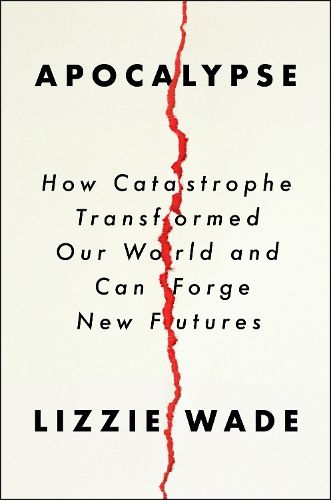Readings Newsletter
Become a Readings Member to make your shopping experience even easier.
Sign in or sign up for free!
You’re not far away from qualifying for FREE standard shipping within Australia
You’ve qualified for FREE standard shipping within Australia
The cart is loading…






A richly imagined new view on the great human tradition of apocalypse, from the rise of Homo sapiens in our deep past to the climate instability of our present, and a look at how the new tools of archaeology reveal these upheavals as moments that created the world we live in, and continue to offer surprising opportunities for radical change.
A drought lasts for decades, a disease rips through a city, a civilization collapses. When we finally uncover the ruins, we ask: what happened And so Apocalypse begins by traveling deep into the past, to when Homo sapiens went from being one of many to the only human species on the planet-the apocalypse of extinction that in some ways started it all. We'll watch global sea levels rise with devastating speed, and natural disasters shape the landscape in new ways. You've heard of some of the apocalypses that come next: the end of Old Kingdom Egypt, the collapse of the Classic Maya, the Black Death.
The good news is: We've been here before. History is long, and people have already confronted just about every apocalypse we're facing today. But these days, archaeologists are getting better at seeing stories of survival, transformation, and even progress hidden within those histories of collapse and destruction. Apocalypse offers a new way of understanding human history, reframing it as a series of crises and cataclysms that we survived, moments of choice in an evolution of humanity that has never been predetermined or even linear. Defying conventional wisdom and long-held stories about our deep past, Lizzie Wade uses new archaeological evidence to reveal how cataclysmic events are not irrevocable endings, but transformations: Apocalypses do not destroy, but create, new worlds.
Apocalypse reckons with these events, how people have survived them, and what legacies they've imprinted upon our cultures and our psyches. The more we learn about apocalypses past, the more hope we have that we will survive our own. It won't be pleasant. It won't be fair. The world will be different on the other side, and our cultures and communities-perhaps even our species-will be different too.
$9.00 standard shipping within Australia
FREE standard shipping within Australia for orders over $100.00
Express & International shipping calculated at checkout
Stock availability can be subject to change without notice. We recommend calling the shop or contacting our online team to check availability of low stock items. Please see our Shopping Online page for more details.
A richly imagined new view on the great human tradition of apocalypse, from the rise of Homo sapiens in our deep past to the climate instability of our present, and a look at how the new tools of archaeology reveal these upheavals as moments that created the world we live in, and continue to offer surprising opportunities for radical change.
A drought lasts for decades, a disease rips through a city, a civilization collapses. When we finally uncover the ruins, we ask: what happened And so Apocalypse begins by traveling deep into the past, to when Homo sapiens went from being one of many to the only human species on the planet-the apocalypse of extinction that in some ways started it all. We'll watch global sea levels rise with devastating speed, and natural disasters shape the landscape in new ways. You've heard of some of the apocalypses that come next: the end of Old Kingdom Egypt, the collapse of the Classic Maya, the Black Death.
The good news is: We've been here before. History is long, and people have already confronted just about every apocalypse we're facing today. But these days, archaeologists are getting better at seeing stories of survival, transformation, and even progress hidden within those histories of collapse and destruction. Apocalypse offers a new way of understanding human history, reframing it as a series of crises and cataclysms that we survived, moments of choice in an evolution of humanity that has never been predetermined or even linear. Defying conventional wisdom and long-held stories about our deep past, Lizzie Wade uses new archaeological evidence to reveal how cataclysmic events are not irrevocable endings, but transformations: Apocalypses do not destroy, but create, new worlds.
Apocalypse reckons with these events, how people have survived them, and what legacies they've imprinted upon our cultures and our psyches. The more we learn about apocalypses past, the more hope we have that we will survive our own. It won't be pleasant. It won't be fair. The world will be different on the other side, and our cultures and communities-perhaps even our species-will be different too.